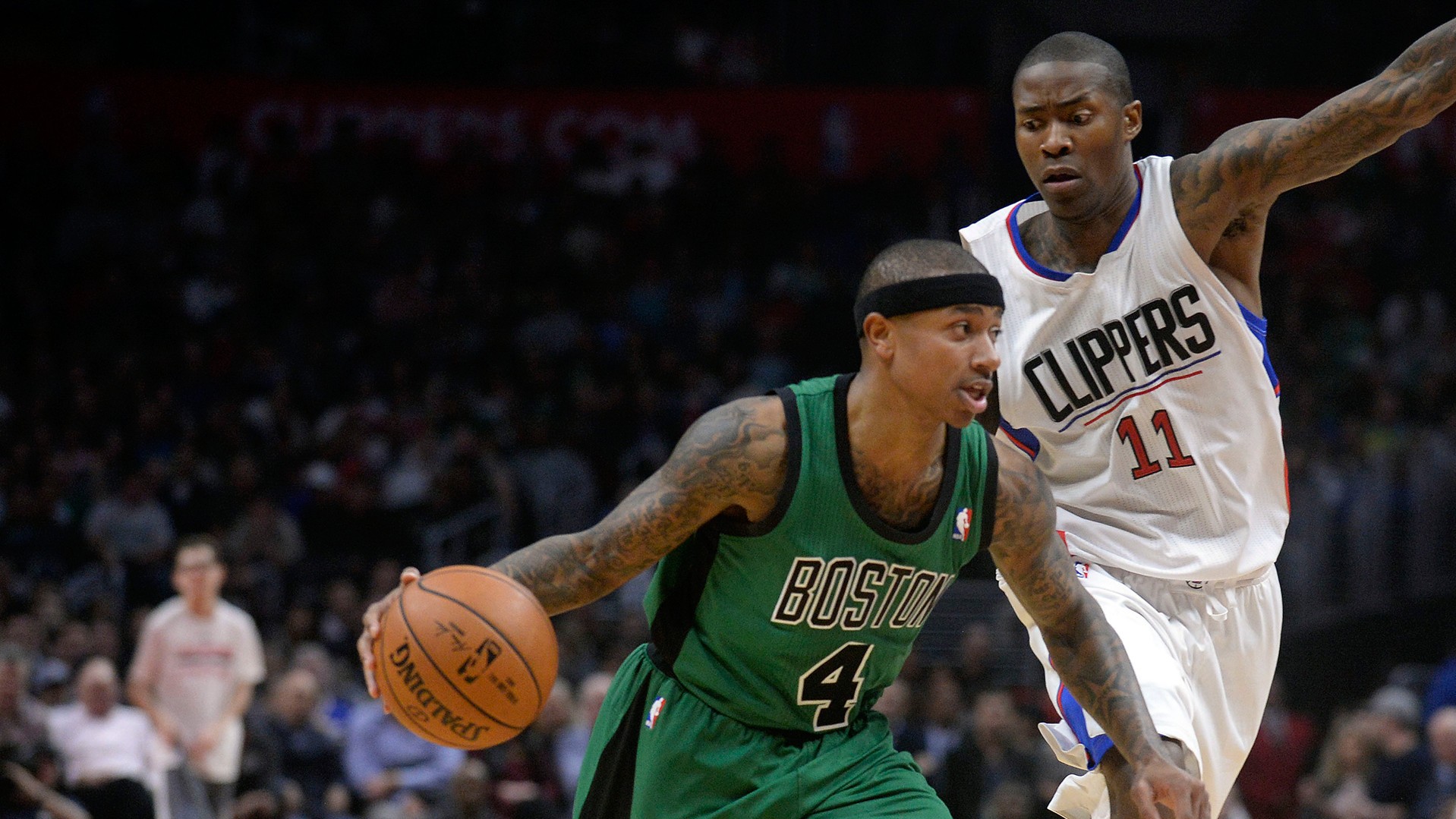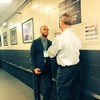A year ago, the Boston Celtics were one of five teams invited to pitch All-NBA supernova Kevin Durant on why he should leave the Oklahoma City Thunder and hop aboard their ship. Despite being one of the youngest teams in the NBA and having zero playoff series wins since 2013, Boston was a strong option, armed with a boatload of draft picks, an All-Star point guard in Isaiah Thomas, and a brilliant head coach in Brad Stevens. Durant, however, also had an unparalleled opportunity to complete one of the greatest basketball teams ever assembled, and the rest is history.
Advertisement
The Celtics responded by maxing out Al Horford, pacing the East in wins, and making a run to the Conference Finals without relinquishing a single asset for someone like Jimmy Butler or Paul George. The long-term strategy all along was to maintain their youth, stockpile their lottery picks, and land another max contract in free agency.Boston wants success in the near term, too, as was made crystal clear on Tuesday when Gordon Hayward, a rising 27-year-old forward with a rock-solid repertoire, decided to sign with Boston over the Miami Heat and incumbent Utah Jazz. Hayward will keep the Celtics at or near the top of the Eastern Conference through his new four-year contract (which has a player option in the final season) and then some.Hayward is not Durant. His presence doesn't guarantee championship contention, nor is he seemingly able to drop 35 points while blindfolded with one arm tied behind his back. He was, however, the single most attractive free agent who was realistically attainable for the Celtics, and he fits Boston's roster and system like a glove. Hayward thrives as an unselfish playmaker who doesn't panic when the shot clock is winding down. There's an unruffled element to his game, be it with regards to his shot selection or decision-making. He doesn't unnecessarily hoist up contested shots just because he feels like he's good enough to make them. A 6'8" swingman who finished fourth in Offensive Real Plus-Minus at his position (behind LeBron James, Kawhi Leonard, and Durant), he was the first option on a 51-win Jazz squad last year.
Hayward thrives as an unselfish playmaker who doesn't panic when the shot clock is winding down. There's an unruffled element to his game, be it with regards to his shot selection or decision-making. He doesn't unnecessarily hoist up contested shots just because he feels like he's good enough to make them. A 6'8" swingman who finished fourth in Offensive Real Plus-Minus at his position (behind LeBron James, Kawhi Leonard, and Durant), he was the first option on a 51-win Jazz squad last year.

Advertisement
Both Utah and Boston embody an altruistic style that calmly reacts to the defense's scheme by jabbing them with side-to-side passes, screens on and off the ball, baseline cuts, and direct hand-offs that function like a slingshot. In Utah's pass-happy system, Hayward could loom on the weak side, either spacing the court, sprinting up to attack off a DHO, coming off a screen, or diving toward the paint to catch a lob. (Hayward is very, very athletic.)Stevens will use him in those ways and more. Horford's vision will allow a few nightmarish wrinkles to sneak into Boston's playbook, and the ATO backdoor lobs will force opposing coaches to wrap a wall around the basket. On the defensive end, Hayward possesses enough strength, length, and quickness to stick with several different positions, meaning he won't harm a switch-happy strategy.
Photo by Chris Nicoll - USA TODAY Sports
Hayward will start at the three and slide up to power forward (or down to shooting guard) when necessary in "small" lineups that are held together by Horford's five-star-restaurant-caliber service at the five. (Given Stevens' penchant for big lineups, it's probable that Boston's opening day starting five features a Horford/Ante Zizic frontcourt.)Hayward is a constant threat with or without the rock. He finished in the 87th percentile as a pick-and-roll ball-handler, the 84th percentile as a spot-up threat, and the 85th percentile on cuts last season, per Synergy Sports, meaning Stevens can eventually deploy jumbo lineups that don't sacrifice speed, athleticism, offensive punch, or defensive versatility so long as the best player in Butler history is on the court.
Advertisement
Hayward made nearly 40 percent of his threes last year, a number that climbed closer to 43 percent when no defender was within four feet of his release, per NBA.com. He eats hard closeouts for lunch and, depending on how the defense wants to guard him, can either unspool a series of nifty tricks around the rim or step into a trustworthy one-dribble pull-up jumper. Similar to how Durant waltzed into a cushy role that let him feast on more desirable opportunities with the Golden State Warriors, Hayward should see more looks in the restricted area, along with a couple cleaner catch-and-shoot tries every night.Boston offers Hayward a level of support and a menu of options that his former team could not. Since becoming one of the world's 20 best players, Hayward has never played with a pick-and-roll partner like Horford, or been able to take several possessions off and watch his point guard repeatedly plunge a samurai sword into the defense's gut like Thomas can. Rudy Gobert was a phenomenal roll man who sucked help defenders in whenever he dove toward the rim, but Horford can do that and pop beyond the arc for an open three—combined with other shooters on Boston's roster, it gives Hayward the kind of serious gravity at center he didn't experience very much in Utah. Five out action will increase his already impressive efficiency.The Celtics will also play a lot faster than the Jazz could, which Hayward should appreciate, as he's a spear in transition. They'll be able to jack up even more threes and go hunting in transition without fear of getting bludgeoned on the glass like they did last season. A big reason Boston struggled on the boards last year was because they leaned on Marcus Smart as a wing in three-guard lineups. (Also, Amir Johnson couldn't move.) Zizic will help, but just as important will be the size increase at shooting guard and small forward.
Advertisement
The attention Hayward warrants from opponents, in turn, will make life so much easier for everybody else. The days of triple-teaming Thomas in a playoff series are over. Help defenders in the weak-side corner can't rotate off and ignore Hayward like they did Jae Crowder or Brown a couple months ago, for fear he'll run off a pin-down or humiliate them backdoor. Where Boston once needed Avery Bradley to race around screens and Smart to commandeer its second unit, Hayward will take up more of the team's offensive burden. Those responsibilities will still exist, but they're far less critical with Hayward around, and could give some players the break they need to have a career year on the other end of the floor.Hayward won't become the face of this franchise, but he doesn't need to for Boston to improve. His 62.5 touches per game last year would've ranked third on the Celtics, with more than 22 touches separating him from Thomas. He won't step on the second-team All-NBA guard's toes, in other words, or force him to make unwanted sacrifices while playing for a new contract. Instead, they'll help each other. Hayward is not Butler, a ball-dominant hurricane who regularly holds the ball to attack defenses in isolation. The chance for turbulence is much lower with Hayward in the fold, which only adds to the genius of this signing.The move isn't entirely without costs for Boston. Depth has been sacrificed, which can be a gut punch in the regular season. At the same time, Stevens can now stagger his two top scorers without fear of cutting into the effectiveness of his starting five. Boston's offense won't die when Thomas hits the bench, which will be crucial, particularly down the stretch of a playoff game, should the 5'9" guard's defensive limitations fester into a gaping wound. Boston had the very best clutch offense in basketball last season. Second was Utah, with Hayward existing as someone who can create his own shot without much help.
Advertisement
This acquisition doesn't transform Boston into championship favorites, but they now have a legitimate puncher's chance, depending on who they surrender to clear room for Hayward's incoming max contract. Pricked by a salary cap that came in about $2 million lower than most end-of-season projections predicted, the Celtics are now forced to shed at least two integral pieces from last year's roster: Kelly Olynyk and at least one of Bradley, Crowder, or Smart. But there are ways to do so and add a quality player in the process, as several teams will have serious interest in what Boston's selling.For Bradley, the Dallas Mavericks can offer Seth Curry, or Devin Harris and a heavily protected 2018 first-round pick. There are several moving parts, including Nerlens Noel's restricted free agency and Dirk Nowitzki's, um, salary, but the Mavs should have enough space to absorb Bradley and then re-sign him with Bird Rights in the event Wesley Matthews opts out or plays like a reserve. There are also conceivable paths for the Celtics to package Bradley and Crowder for someone like Eric Gordon, Wilson Chandler, Kenneth Faried, or Derrick Favors, Hayward's former teammate.Hayward is phenomenal, but he's not the obvious missing piece Boston needs to take down the Warriors or the Cleveland Cavaliers. What he does do, however, is create a little bit of separation between the Celtics and fellow also-rans in the East, the Toronto Raptors, the Washington Wizards, and the Milwaukee Bucks. (Remember: Boston could've easily lost in the first or second round instead of the Conference Finals.)Matching up against Cleveland, Hayward is another body to throw at James, but he's not an answer there—no one not named Kawhi is. The Cavs will be older, though, and the physical and mental toll that four straight Finals trips will take on the currently GM-less organization is unquantifiable but significant. Cleveland has few options to improve, and are likely stuck with aging buy-out candidates after the trade deadline, while Boston still has more valuable assets than any team in the league. If the Celtics feel they're close to dethroning the King and then putting up a meaningful fight against the Warriors, the pieces are there for them to make a win-now move.That's all speculation at this point, though. For now, Boston can have their cake, and eat it, too. They don't want to go all-in for a single championship with a two- or three-year window. They want a decade of dominance. Hayward is another step toward achieving that goal.
